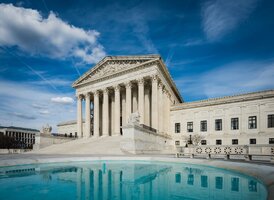PPEcel
cope and seethe
★★★★★
- Joined
- Oct 1, 2018
- Posts
- 29,087

Today, October 2nd, marks the very first day of the U.S. Supreme Court’s newest term. The first case on the calendar, heard earlier today, is Pulsifer v. United States, a relatively technical case on criminal sentencing and statutory interpretation. But very soon, we will expect the Court to weigh in on hot-button issues.
First, a brief recap of some of the based things that the Court accomplished last term. My favorite decision of the 2022-2023 term was Counterman v. Colorado, a case in which the U.S. Supreme Court made it more difficult for law enforcement to prosecute online threats. (Feminist critics argued that the Court had effectively legalized stalking.) In Twitter v. Taamneh and Gonzalez v. Google, the Court upheld Section 230 in a victory for tech companies who were sued for hosting terrorist content. The Court’s decision in 303 Creative LLC v. Elenis means that states can no longer wield anti-discrimination laws to compel speech. And who could forget the two affirmative action cases, Students for Fair Admissions v. Harvard and Students for Fair Admissions v. UNC? Two important victories for younger ricecels and currycels.
With all that in mind, I’m cautiously optimistic that the U.S. Supreme Court will continue on its righteous path. Here is my quick rundown of the must-watch cases of 2023-2024:

Consumer Financial Protection Bureau v. Community Financial Services Association of America is on the docket tomorrow, October 3rd. The U.S. Supreme Court will decide whether the funding structure of an entire government agency—the CFPB—is constitutional. Ostensibly created to protect American consumers, the CFPB has in recent years focused its legal resources on imposing “equity-focused” rules. One recent rule requires financial institutions to report the race, ethnicity, and sex of loan applicants—this, of course, has nothing to do with consumer protection. Much to the chagrin of progressives on the Hill, the U.S. Supreme Court is poised to shut down these overreaching, woke bureaucrats.
And this Wednesday, October 4th, the U.S. Supreme Court will hear Acheson Hotels, LLC v. Laufer. Deborah Laufer is a civil rights “tester” who has sued over 600 hotels in four years for not complying with a federal regulation requiring that hotels disclose on their websites whether their rooms are accessible to the disabled. Many of her defendants are small bed-and-breakfast owners who, unlike Marriott and Hilton, do not have in-house legal teams. The question before the Court is one of standing: Can Laufer, someone who has no intention of actually staying at a hotel, be allowed to sue hotels for the “discrimination” she experiences while browsing their websites? Most civil rights advocates do not support Laufer’s grifting, but they fear that the conservative Court will establish an overly restrictive test for plaintiffs to establish standing in future civil rights cases involving discrimination. I pray that their fear becomes reality.
Later this month, on October 31st, the U.S. Supreme Court will hear not one but two cases involving public officials’ usage of social media. The First Amendment provides a right to “petition the Government for a redress of grievances”. In Lindke v. Freed and O’Connor-Ratcliff v. Garnier, the Court will consider whether it is constitutional for elected officials to block their critics on their personal social media accounts. Many of you may recall that just a few years ago, left-wing firebrand Alexandria Ocasio-Cortez was successfully sued for this exact reason—though her case was resolved at the district court level.

Without a doubt, the case with the highest potential for feminist tears this term is United States v. Rahimi, scheduled for oral argument on November 7th. Does the Second Amendment allow the government to take guns away from individuals with domestic violence restraining orders? In a based ruling that enraged soycucks, a Texas-based federal appeals court said no, holding that there is no “historical tradition” of taking guns away from domestic abusers. The Biden administration now wants the U.S. Supreme Court to reverse the Fifth Circuit. Whichever way Rahimi is resolved, the Court’s decision will have implications beyond domestic abusers. The dubious constitutionality of red-flag laws hasn’t stopped their proliferation in recent years, and it’s entirely foreseeable that so-called “extreme risk protection orders” could be used as retaliation for unpopular but constitutionally protected speech, including incel speech. Should the Court rule in favor of Zackey Rahimi—the alleged domestic abuser in this case, pictured above—they could provide an easier blueprint for challenging red-flag laws more generally. Here’s hoping that the U.S. Supreme Court affirms the Fifth Circuit and upholds the Second Amendment rights of misogynists.
After Rahimi, the next case to watch is Loper Bright Enterprises v. Raimondo, which hasn’t been scheduled for argument yet. Loper Bright is a direct challenge to a decades-old administrative law doctrine known as Chevron deference. In layman’s terms, Chevron generally requires the judiciary to defer to a government agency’s interpretation of a statute. Since federal regulations govern virtually every aspect of American life, from bump stocks to greenhouse gas emissions, overruling Chevron would have positive but far-reaching consequences. (Chevron is, in my opinion, an aberration that insults the separation of powers.) Feminists' primary fear here is that overruling Chevron would make it significantly more difficult for the Department of Education to defend their Title IX rules—the same rules that diminish the due process of male students who are accused of sexual assault—from legal challenges. Indeed, they mounted an unsuccessful campaign to stop Neil Gorsuch's nomination to the U.S. Supreme Court over his views on Chevron. But I look forward to reading Justice Gorsuch's opinion in Loper Bright next year.
Last but not least, there are two cases involving social media censorship. The U.S. Supreme Court granted certiorari in Moody v. NetChoice, LLC and Netchoice, LLC v. Paxton just last week. I have written about one of these cases previously. In response to complaints that conservative speech was being suppressed, Texas and Florida both passed laws that bar large social media companies from blocking, removing, or demonetizing content based on their users’ political views. NetChoice, a group representing the tech industry, sued both states, contending that both bills violate the First Amendment rights of the companies themselves. On appeal, the Fifth Circuit upheld the Texas law while the Eleventh Circuit struck down the Florida law—creating a circuit split that the Court is now being asked to resolve. This is the one dispute where my stance is genuinely undecided, for reasons I might go into in a later post. But no matter what happens, the Court’s decision is likely to be spicy.
View: https://twitter.com/NetChoice/status/1708997290017313213
Would love to hear you guys' thoughts.






